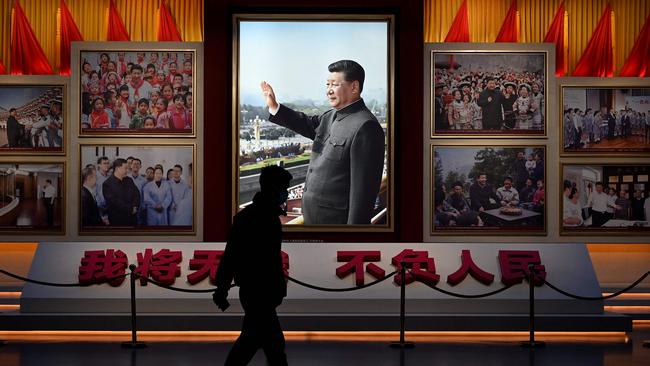Xi Jinping takes place alongside Mao and Deng in China’s pantheon
The party has taken a major step in the president’s ‘ideological crowning’ ahead of precedent breaking third, five-year term.

China’s paramount leader, Xi Jinping, has been endorsed by his fellow elite comrades as one of the three most towering figures in the 100-year history of the Chinese Communist Party.
Mr Xi and 370-odd of the most senior members in the party on Thursday finally emerged from a four-day closed-door meeting that has further elevated his leadership supremacy over the world’s most populous country.
Chris Johnson, a former senior China analyst at the CIA, said it was major step in Mr Xi’s “ideological crowning” ahead of a precedent-breaking third five-year term.
“To criticise Xi now … is not just to attack the man but to attack the party itself,” Mr Johnson told the Sinocism podcast.
“And if you’re going to do it, you better get it right.”
Beijing’s propaganda machine has gone into overdrive to underline the importance of the “historical resolution”, only the third since the party’s founding in 1921.
The People’s Daily, the party’s mouthpiece, has run a series of lengthy front-page commentaries saluting Mr Xi every day since November 1.
Mr Xi has been hailed as a “People’s leader”, and a “Marxist politician, thinker, strategist” who has “immense political courage, intense sense of historical accountability and deep love of the people”, embodying the party’s quality of “not fearing a strong enemy, not fearing risks” and “daring to fight and win”.
Further details of the “historical resolution” will be released on Friday, although much of the discussions will stay vaulted in the party’s tightly guarded history archives.
The only two previous such party “historical resolutions”, in 1945 and 1981, were used to consolidate the authority of Mr Xi’s fellow paramount leaders Mao Zedong and Deng Xiaoping.
Mr Johnson, senior fellow at Washington’s Centre for Strategic International Studies, said Mr Xi’s use of party history demonstrated his masterful political skills.
“He may not be God’s gift to intellect but there’s no question in my mind that from a political acumen point of view, he’s a genius, a tactical genius,” he said.
While Beijing’s political elite have been locked up in the Jingxi Hotel elevating Mr Xi, pockets of coronavirus cases have flared across the country.
In an unusually critical interview this week, one of China’s most respected infectious disease experts said the country needed to move past its “zero tolerance” approach to Covid-19 – one of Mr Xi’s signature policies.
“Local governments are adopting zero tolerance to these scattered cases,” Guan Yi told the Hong Kong-based Phoenix TV in an interview broadcast during the party meeting.
“But if that remains the case, I think our economy will collapse … I think there is no chance if we set a goal to eliminate all cases,” said Mr Guan, a director of the State Key Laboratory of Emerging Infectious Diseases at Shantou University in southern China.
“Just like influenza, this virus already has a foothold in mankind and it will stay with us for the long term – it is a fact, whether we like it or not. This virus has already fully adapted itself in humans.”
China reported 47 new domestic cases of Covid-19 cases, according to its official numbers.
While those numbers are tiny by international standards, the country’s ongoing “zero Covid” approach means they have led to targeted lockdowns in at least six Chinese provinces. China had given 1.072 billion people complete Covid vaccine doses – just over 75 per cent of its population – according to China’s National Health Commission.
The majority of vaccinations have been by the Chinese-made Sinovac and Sinopharm jabs, which have released less information than their international peers.
Mr Guan said it was crucial that pharmaceutical companies were more open about their jabs. “If a vaccine is not effective, we should remove it. If we don’t have sufficient understanding … we don’t have the (chance) to make improvements, especially when vested interests are involved,” he said.




To join the conversation, please log in. Don't have an account? Register
Join the conversation, you are commenting as Logout